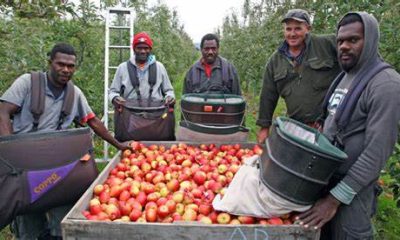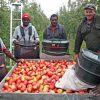Jobs in Canada
Multiple Farm Workers Job Vacancies in Canada
Canada, known for its stunning landscapes, cultural diversity, and robust economy, is an ideal destination for those seeking employment opportunities abroad. The country’s vast and varied agricultural sector is a cornerstone of its economy, offering plentiful job openings for farm workers.
Working in Canada’s agriculture industry provides competitive wages and benefits and offers a unique chance to experience the country’s natural beauty and welcoming communities. Moreover, Canada’s commitment to worker welfare and numerous pathways to permanent residency make it an attractive option for individuals looking to build a stable and prosperous future.
Canada’s agricultural sector is experiencing a significant demand for farm workers, creating numerous job opportunities for individuals interested in working in this vital industry. The country’s diverse farming landscape, which includes everything from large-scale grain farms in the Prairies to fruit orchards in British Columbia, offers a variety of roles for farm workers.
Why Work in Canada’s Agriculture Sector?
– High Demand for Labor: The Canadian agricultural industry faces a labor shortage, making it an attractive destination for farm workers. The need for workers spans across planting, harvesting, and processing seasons.
– Diverse Job Roles: Opportunities range from planting and cultivating crops to operating farm machinery and tending to livestock. Whether you have experience or are looking to start anew, there’s a role for you.
– Competitive Wages and Benefits: Farmworkers in Canada often receive competitive wages, sometimes with additional benefits such as housing, transportation, and health insurance.
– Pathways to Permanent Residency: Canada offers various immigration programs that provide pathways for farm workers to become permanent residents, allowing them to settle and build a future in the country.
Types of Farm Worker Roles Available
Each of these roles offers unique responsibilities and opportunities, catering to various interests and skill sets within the agricultural sector.
General Farm Workers: These workers are involved in planting, cultivating, and harvesting crops. They may also handle livestock and perform general farm maintenance tasks.
Equipment Operators: These workers operate and maintain farm machinery such as tractors, harvesters, and irrigation equipment.
Fruit and Vegetable Pickers: These seasonal workers are responsible for picking fruits and vegetables, often working in orchards, vineyards, and vegetable farms.
Livestock Handlers: These workers care for animals, including feeding, cleaning, and monitoring their health.
Greenhouse Workers: These workers are responsible for planting, watering, and maintaining plants in greenhouse environments.
Dairy Farm Workers: These workers manage daily operations on dairy farms, including milking cows, feeding, and maintaining dairy equipment.
Poultry Farm Workers: These workers take care of poultry, including feeding, cleaning, egg collection, and ensuring the health of the birds.
Crop Scouts: These workers monitor crop health, looking for signs of disease, pests, and nutrient deficiencies.
Irrigation Technicians: These workers manage and maintain irrigation systems to ensure crops receive adequate water.
Farm Maintenance Workers: These workers perform maintenance tasks around the farm, such as repairing fences, buildings, and equipment.
Organic Farm Workers: These workers focus on sustainable and organic farming practices, including soil management, crop rotation, and organic pest control.
Horticultural Workers: These workers specialize in growing flowers, ornamental plants, and trees for landscaping and garden use.
Qualifications and Requirements
While many farm worker positions in Canada do not require formal education, having certain skills and attributes can significantly enhance your chances of securing a job and succeeding in the role:
Physical Stamina: Farm work is physically demanding and often involves long hours of standing, bending, lifting, and performing repetitive tasks. You should be in good physical health and capable of handling the rigors of the job.
Basic Farming Knowledge: Although not always mandatory, having a basic understanding of farming practices can be beneficial. This includes knowledge of planting, cultivating, and harvesting crops, as well as handling livestock.
Willingness to Learn: Many employers provide on-the-job training. A positive attitude and willingness to learn new skills can make you a valuable asset to any farm.
Flexibility: Farm work often requires early mornings, long days, and working in various weather conditions. Being flexible and adaptable to changing schedules and tasks is crucial.
Attention to Detail: Precision is important in tasks such as planting, sorting, and packing produce. Attention to detail ensures the quality and efficiency of farm operations.
Teamwork Skills: Working well with others is essential, as farm work often involves collaboration with a team to complete tasks efficiently.
Language Skills: Basic English or French proficiency can be helpful, especially for understanding instructions and communicating with supervisors and coworkers.
Valid Work Permit: Non-Canadian workers must obtain the necessary work permits and visas to be legally employed in Canada. Employers often assist with this process, but it’s important to understand the requirements and ensure all documentation is in order.
How to Apply
If you are interested in exploring farm worker vacancies in Canada, numerous resources are available to help you find and apply for these positions. From job boards to direct applications with farm owners, there are various ways to secure a role in this thriving industry.















